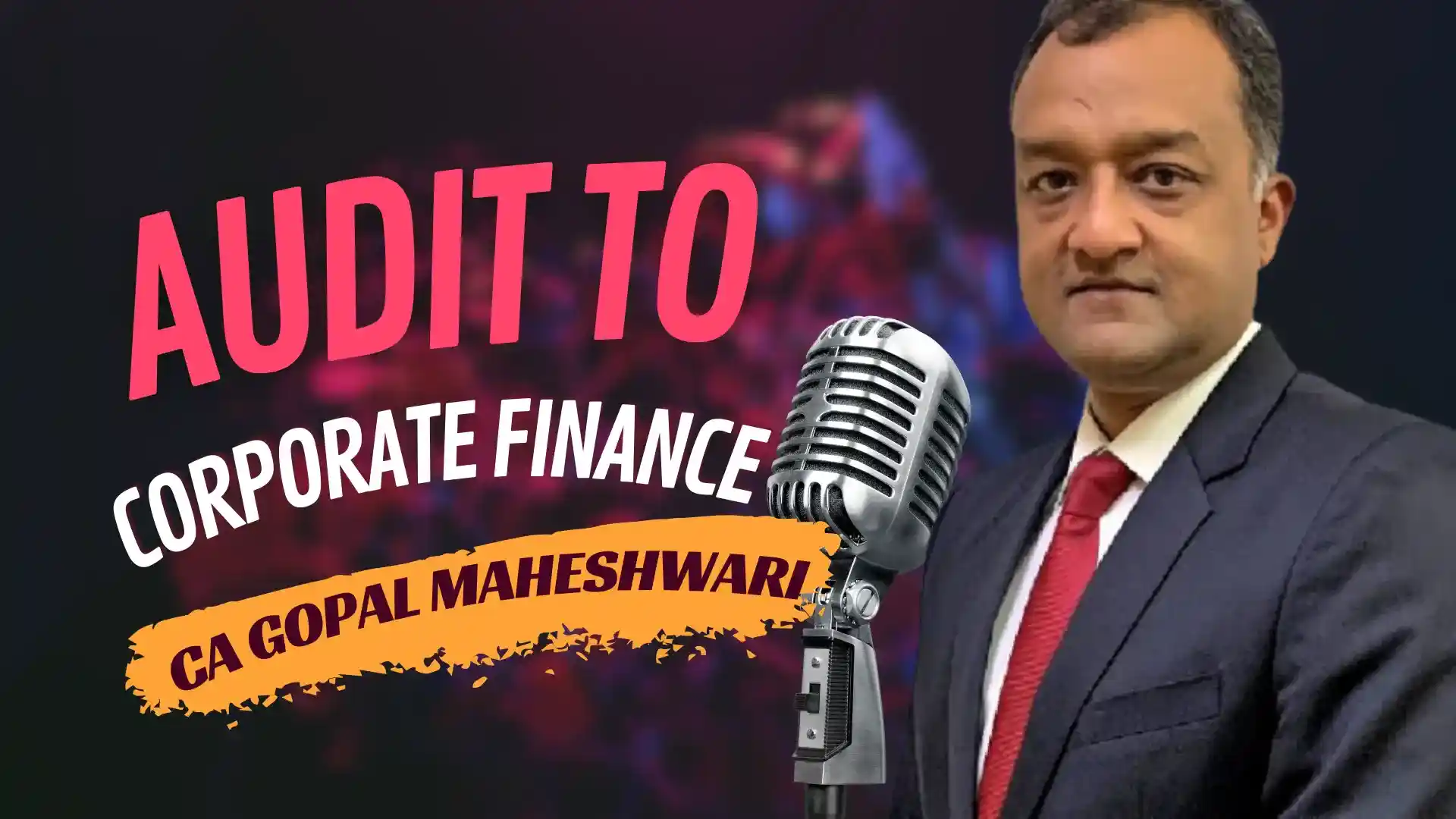Key Highlights:
- Gopal Maheshwari is a CA and heads GM Corporate Solutions in New Delhi.
- Began his journey in 1995 with EY, moving on to PwC, KPMG, and a UK CFO role.
- Expertise grew from auditing to taxation and eventually corporate finance.
- In 2012, he launched his advisory firm, GM Corporate Solutions.
- Offers guidance on shifting from Audit/Accounting to Corporate Finance.
Also Read: From India to Dubai: Akshay Kenkre’s Tax Journey
The Journey of CA Gopal Maheshwari:
From Engineering Aspirant to Chartered Accountant Maestro
The tale of Gopal Maheshwari is a testament to the twists and turns life can offer. Today, when one looks at Gopal, they see a successful Chartered Accountant, a partner at GM Corporate Solutions based in New Delhi. They see a man whose company stands tall in the domain of investment banking and strategic advisory. They see a trusted adviser in the realm of domestic and international M&A deals across various sectors. But the road to this success was not a straight one.
Gopal’s academic journey began far from the world of commerce. Until Grade 12, he was deeply engrossed in science. His dreams were focused on engineering, and like countless Indian students, he aspired to crack the formidable IIT entrance exams. But as destiny would have it, the coveted IITs remained out of reach.
It was a crossroads moment. With limited knowledge of alternative career pathways for science students, his parents became his guiding light. They nudged him towards the world of commerce, suggesting a pursuit of the Chartered Accountant profession. Heeding their advice, Gopal transitioned streams and embarked on a new journey.
The year 1999 marked a significant milestone. Gopal officially became a Chartered Accountant, accredited by the esteemed ICAI (The Institute of Chartered Accountants of India).
Fresh out of his qualifications, Gopal landed an opportunity with one of the Big 4, Ernst & Young (EY). His initial profile centered around auditing major corporations. This phase, though primarily rooted in auditing, sowed the seeds for his eventual foray into corporate finance.
However, Gopal’s thirst for knowledge was not satiated. He yearned for exposure to other finance domains, especially taxation. Knowing the constraints of internal movement within Big 4 firms, Gopal made a strategic shift. He moved to a medium-sized firm, diving deep into the intricacies of Tax Compliance & Litigation. For about 18 months, Gopal immersed himself, gaining a hands-on experience that he so desired.
This experience became his ticket back into the Big 4, but this time with PwC. Gopal’s time in their International Tax division further enriched his profile. Three years at PwC solidified his belief that the detour to the mid-sized firm had indeed been a wise decision.
Yet, after nearly a decade in consultancy, another transformation beckoned. Gopal transitioned from advising businesses to being an integral part of one. He took the reins as CFO of a UK-based company. The next 4.5 years were a whirlwind. Setting up India-based operations, handling corporate finance functions, undertaking acquisitions, managing commercial operations, and liaising with stakeholders—it was all in a day’s work for Gopal.
The highlight? Orchestrating a significant deal that involved selling the company’s operations to another UK entity. This phase provided Gopal with a comprehensive understanding of corporate finance, treasury, and banking.
But the allure of consultancy remained. Gopal returned, joining KPMG as an Associate Director. However, with time, a vision began to form—a vision of a consulting firm that wasn’t just about tax but one that covered the entire spectrum of transactions.
Thus, GM Corporate Solutions was born. A venture that combined Gopal’s vast experience in transaction advisory, corporate finance, tax, and compliances. A venture that is today a beacon in its field.
Gopal Maheshwari’s story is a lesson in perseverance, adaptability, and strategic thinking. From aspiring to be an engineer to establishing a leading consultancy firm, his journey is an inspiration for many.
Also Read: Considering starting a Tax Firm in Dubai? Get insider tips
Understanding Corporate Finance and Its Distinction from Accounting and Auditing
At first glance, terms like corporate finance, auditing, and accounting might seem intertwined and somewhat confusing. But in reality, they play distinct roles in the business world. Let’s break them down into simple, easy-to-understand definitions.
1. Accounting: Imagine you own a big jar, and every day you throw coins into it. At the end of the month, you sit down and note how many coins you’ve put in. This act of noting down is essentially what accounting is about. It’s the process of recording all financial transactions made by a company. Every sale, every purchase, every penny spent or earned gets recorded.
2. Auditing: Now, suppose at the end of the year, you ask a friend to count the coins in the jar and ensure your notes are correct. Your friend is essentially playing the role of an auditor. Auditing is about checking the records (like the notes you made) to see if they are accurate and reasonable. It’s a verification step to ensure that everything is as it should be and there’s no foul play or mistake.
3. Corporate Finance: Now, think about why you’re saving those coins. Maybe you want to buy a bike, or you’re saving up for a vacation. You might be thinking about how many coins you’ll need or finding other ways to get more coins faster. This planning and managing of your coins for future goals is similar to corporate finance. In the business world, instead of coins, we’re talking about funds or money. Corporate finance is about managing a company’s money and making decisions about how to raise and use it. It looks into all aspects of funds required by a company.
The Difference Between Finance Teams and Corporate Finance Teams:
Most companies have teams dedicated to managing their money. But what’s the difference between a standard finance team and a corporate finance team?
Imagine the finance team as the bookkeepers of your jar. They note down the coins, make sure the records are right, and report how the jar is doing. But the corporate finance team is like the strategists. They think about how to get more coins, whether it’s a good idea to spend on that bike or go on vacation, or maybe even consider pooling in coins with a friend for a joint venture.
In business terms, while both might deal with money, their roles are distinct:
- The finance team focuses on recording and reporting transactions. They’re the backbone ensuring everything is noted and accounted for.
- The corporate finance team, on the other hand, delves into bigger decisions. They strategize on raising funds, whether the company should merge with another, or if it’s a good time to invest in a new project. They are the planners, ensuring the company has the funds it needs for its goals.
In some mid-sized companies, these roles might overlap, with the finance team wearing multiple hats. But in larger companies, they usually have dedicated departments for these distinct functions.
While all these terms revolve around money, each plays a unique role in ensuring a company’s financial health and growth.
Specialization in Corporate Finance:
Is specialization a thing in corporate finance? The simple answer is ‘yes’. While some firms might dive deep into debt syndication or raising capital for startups, others might be engrossed in mergers, acquisitions, or valuations. There’s a broad spectrum to explore.
However, Gopal’s venture isn’t limited. GM Corporate Solutions is a boutique investment banking firm that doesn’t restrict itself. With abundant resources and opportunities, they cater to a plethora of services in corporate finance, remaining sector-neutral.
Making the Transition: From Audit to Corporate Finance:
Switching careers, especially from audit to corporate finance, can be tricky. Based on Gopal’s insights, here are some simplified guidelines:
- Early Transition: Considering a change? Do it sooner than later. Aim to switch within the first 2-3 years after qualifying in audit.
- Focus in Articleship: Your stint in audit isn’t just a phase; it’s your foundation. Being diligent can be your edge. If you understand businesses deeply and have a stronghold over accounting, you’re already ahead. Plus, having exposure to diverse industries gives you an advantage in corporate finance.
- Leverage Your Experience: Start with what you know. If you’ve audited certain industries, use that knowledge. Understanding their processes, functions, and challenges can be your stepping stone.
- Join Early, Learn Continuously: A feasible route? Start with a corporate finance consulting firm. Beginning with diligence services can be a good choice. As you grow, the world of corporate finance will unfold.
- Education Matters: Thinking of brushing up on fundamentals? Opt for renowned courses, like CFA or other global corporate finance certifications. They’ll not only ground you in the basics but will also give you a global perspective.
Gopal Maheshwari’s journey is a testament to dedication and continuous learning. The realm of corporate finance is vast, but with the right approach, transitioning from audit or any other field is achievable. Whether you’re an aspiring CA or a professional looking to pivot, Gopal’s insights can be your guiding star.
Is Corporate Finance a Lucrative Path? Comparing with Auditing and More.
The Financial Rewards of Corporate Finance: There’s no denying it – corporate finance is, without a doubt, one of the more financially rewarding careers in the finance industry. Given the intricate nature of tasks involved, including financial modeling, valuation, and deal structuring, professionals in this field often command a premium salary. Additionally, bonuses and incentives based on successful deals or transactions can further augment the earning potential in this sector.
However, the allure of a lucrative paycheck also means that the space is swarmed with some of the brightest minds, making it a highly competitive arena. The message is clear: if you’re considering a journey into corporate finance, resting on your laurels isn’t an option. Continuous learning and an unwavering pursuit of excellence become prerequisites.
Corporate Finance vs. Auditing:
While both corporate finance and auditing come under the broad umbrella of finance, their compensation structures can vary significantly. Auditing, especially at entry and mid-levels, may not offer the same level of compensation as corporate finance roles. However, senior auditors, especially those in managerial or partnership roles in big firms, can earn quite handsomely.
That said, on average and especially at the start, a corporate finance role might offer a higher salary than an auditing one, especially if you’re part of a successful deal team or working on high-profile transactions.
Beyond the Big 4s: Who’s Hiring? The Big 4 accounting firms (Deloitte, PwC, EY, and KPMG) indeed dominate a significant share of the corporate finance and auditing market. However, they’re not the only players in town.
Various boutique investment banks, often specialized in specific sectors or deal sizes, actively seek corporate finance professionals. Additionally, mid-sized corporate finance advisory firms, which provide a myriad of support services for diverse transactions, also have a robust demand for such roles.
Corporate finance, with its intricate challenges and high stakes, undeniably offers a rewarding financial career. However, as with any high-reward profession, it comes with its fair share of competition. Success in this field often requires not just technical expertise but also a keen understanding of industries, market dynamics, and excellent networking skills. So, for those who are ready to embrace the challenges and continuously push the envelope, the world of corporate finance awaits.
The Journey of a Corporate Finance Maverick
Once upon a time, there was a budding professional navigating the intricate maze of the corporate finance world. How did he conquer it? Well, his story started as a CFO, where he had the privilege of leading M&A transactions. But that was just the beginning.
His journey took an even more exciting turn when he worked on transactions tax and due diligence at a global powerhouse, KPMG. These roles enriched his experience, making him confident enough to carve his own path in the dynamic world of corporate finance.
But success wasn’t just about experience. He had an insatiable thirst for knowledge. He would devour books and articles, always eager to learn more about his field. This constant learning helped him grasp the essence of corporate finance: analyzing businesses, tuning into the client’s needs, and using his expertise to offer real-world solutions.
Moreover, he knew that every client was a unique puzzle. This understanding, combined with his adaptive mindset, laid the foundation for his advisory practice. Each project brought new challenges, but he was always up for it.
Now, what about his team at GM Corporate Solutions?
The firm was a blend of talent. From sharp MBAs to meticulous Chartered Accountants and eager articled trainees, they had it all. After all, they weren’t just any corporate finance firm; they also ran a CA practice side-by-side.
Their main area of expertise? M&A transactions, especially those that spanned borders. Whether it was facilitating businesses entering foreign markets or foreign businesses setting foot on domestic soil, they were the go-to experts. Their services didn’t end there. They also delved into due diligence reviews, valuations, and debt syndication.
For those looking to join the team, the experience was unique. New members weren’t limited to auditing. Instead, they were introduced to the exhilarating world of corporate finance and investment banking.
In the end, the journey of this professional wasn’t just about climbing the corporate ladder. It was about passion, learning, and the desire to make a difference in the world of finance.
Concluding…
A role in Corporate Finance is forward-thinking, strategic, proactive, and entrepreneurial in nature, and if you have good commercial awareness and a natural interest in business, it could be the right career path for you!
Take up roles in boutique firms, do pursue recognized certification courses, and be prepared to work hard!








0 Comments